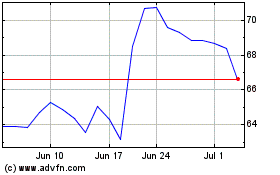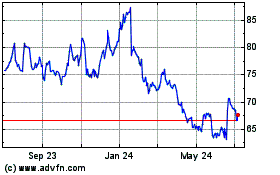Gilead Seeking FDA Panel Backing Of Inhaled Antibiotic
December 08 2009 - 11:38AM
Dow Jones News
Gilead Sciences Inc. (GILD) is hoping a federal advisory panel
will prod the Food and Drug Administration to reverse a decision
involving a proposed inhaled-antibiotic designed to treat a
stubborn lung infection in cystic fibrosis patients.
Last year the FDA refused to approve the drug, inhaled
aztreonam, saying the clinical evidence was insufficient to show
whether the product was effective. Gilead has proposed a brand name
of Cayston for the drug. Aztreonam was originally approved in 1986
as an intravenous or IV drug and is also available as an
injection.
One of the main clinical studies showed that Cayston was
effective when given three-times a day when compared to patients
receiving a placebo, or fake drug, but when given twice daily, the
drug was no better than the placebo. All patients in that study
were also previously treated with another inhaled antibiotic.
Gilead is seeking FDA approval for Cayston as a three-times daily
inhaled treatment.
Gilead said, in a document posted to the FDA's Web site Tuesday,
that it filed a dispute resolution with the agency involving the
issuance of the so-called complete response letter, which was dated
Sept. 16, 2008.
The complete response letter outlined why the agency wasn't
approving the product. Gilead said its dispute resolution was
denied in February, so the firm submitted a higher-level appeal
with the agency's Office of New Drugs and included additional
analyses of one of the clinical studies in question.
While the Office of New Drugs also denied the company's appeal,
the office said the company could submit the additional analysis
and request an advisory committee meeting. The agency's
anti-infectives drugs advisory committee will consider Cayston
Thursday.
The panel is made up of outside medical experts who are being
asked to vote on whether Gilead has provided "substantial" evidence
of the effectiveness and safety of the inhaled antibiotic. The FDA
usually follows its panel's advice but is not required to do
so.
Specifically, Gilead is seeking FDA approval of Cayston to treat
a bacterial lung infection known as Pseudomonas aeruginosa or PA in
patients with cystic fibrosis, an inherited disease that affects
the lungs and digestive system. The disease, which is believed to
affect about 30,000 Americans, causes mucus to build up in the
lungs and digestive tract. Lung infections are common.
The FDA said, in a document prepared for Thursday's meeting,
that Gilead's re-analyses of the study involving the twice-daily
and three-times daily dosing, "could not be shown to be robust
under varying conditions." The agency also said patients receiving
Cayston three-times daily had higher hospitalization rates than
those in the placebo group.
Gilead said the totality of the Cayston dataset, which involves
two Phase 3 studies required for FDA approval, along with an
extension study, "supports a favorable risk-benefit
assessment."
-By Jennifer Corbett Dooren, Dow Jones Newswires; 202-862-9294;
jennifer.corbett@dowjones.com
Gilead Sciences (NASDAQ:GILD)
Historical Stock Chart
From Sep 2024 to Oct 2024

Gilead Sciences (NASDAQ:GILD)
Historical Stock Chart
From Oct 2023 to Oct 2024
